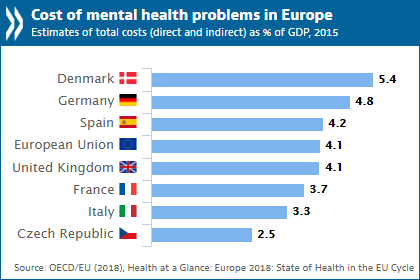Greater efforts to promote mental health and improve early diagnosis could help millions of Europeans and contribute to stronger economic condition, the OECD and European Commission said in the Health at a Glance: Europe 2018.
Besides the impact on people’s wellbeing, the report estimates the total costs of mental ill-health at over €500bn – more than 4% of GDP – across the 28 EU member states.
A large part of these costs are due to lower employment rates and productivity of people with mental health issues, estimated at €170bn. The report suggested another €170bn is spent on social security programmes and the rest (€190bn) on healthcare.
OECD secretary general Angel Gurría said: “The heavy burdens of mental illness on individuals and society are not inevitable.
“While many European countries have put in place policies and programmes to address mental illness, much more can be done to promote and better manage mental health.”
The report highlighted that mental health problems in Europe cost as much as 5.4% of GDP in some countries, such as in Denmark. In Germany, the cost was estimated at 4.8% of GDP and 4.2% in Spain. [image in pic folder]
Additionally, it found that total health spending has grown in line with the economy in 2017, and accounts for 9.6% of EU GDP.
France and Germany each spent more than 11% of their GDP on health care in 2017, followed by Sweden, Austria, Denmark and the Netherlands, with each spending over 10%. Countries in the Eastern part of the EU tend to spend much less, with shares ranging from 5% to 6% of GDP.
It also highlighted that life expectancy gains in many European countries had slowed in recent years, such as in France, Germany and the UK.








